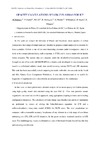Please use this identifier to cite or link to this item:
https://accedacris.ulpgc.es/jspui/handle/10553/45575
| Title: | Opacity calculations of low Z plasmas for ICF | Authors: | Rubiano, J. G. Martel, P. Gil, J. M. Rodriguez, R. Florido, R. Mendoza, M. Suarez, D. Minguez, E. |
UNESCO Clasification: | 22 Física 220715 Energía nuclear |
Keywords: | Plasma | Issue Date: | 2008 | Project: | Desarrollo de Un Codigo de Dagnosis de Plasmas Ultradensos y Calientes Empleando Potenciales Atomicos Analiticos y Potenciales Con Correlacion Ion-Ion. | Conference: | 35th European Physical Society Conference on Plasma Physics, EPS 2008 Combined with the 10th International Workshop on Fast Ignition of Fusion Targets | Abstract: | In this work we analyze the behavior of Pl anck and Rosseland mean opacites of carbon plasmas in a wide range of temperature and densities to propose si mple analytical expressions for these quantities. Carbon is one of the most interesting elem ents under investigation, since it is likely to be a major plasma-facing wall component in ITER, and it plays a major role in inertial fusion scenarios. The opacity data are computed under the detailed-level-accounting approach through the use of the code ABAKO/RAPCAL a kinetic code developed by our research group based in a collisional-radiative steady state model covering corona, NLTE and LTE situations. This code has been successfully tested comparing its results with other proven codes in the fourth and fifth Kinetic Code Comparison Workshops. It also has demonstrated to be useful for diagnostic of experiments as it is described in an oral pr esentation in this conference. 2. Method of calculation In this work we have performed a detailed analysis of the mean opacity for Carbon plasma, using high quality atomic data obtained using the code FAC (1). This code provides atomic magnitudes calculated into the DLA approach, using appropriate coupling schemes and including configuration interaction. The calculation of ioni c charge state distributions and level populations are performed by means of solving the Saha-Boltzmann equations for LTE and a collisional-radiative steady-state model (CRSS) for NLTE cases. The level populations are computed with a reasonable accuracy for plasmas of any element in a wide range of conditions embracing non-LTE, LTE and CE situations. In this paper we have restricted ourselves to LTE cases. The multifrequency opacity is obtained as a sum of the bound-bound, bound free, free-free and scattering contributions. | URI: | https://accedacris.ulpgc.es/handle/10553/45575 | ISBN: | 9781622763351 | Source: | 35th EPS Conference on Plasma Physics 2008, EPS 2008 - Europhysics Conference Abstracts, v. 32, p. 1202-1205 |
| Appears in Collections: | Actas de congresos |
Page view(s)
71
checked on Nov 2, 2024
Download(s)
42
checked on Nov 2, 2024
Google ScholarTM
Check
Altmetric
Share
Export metadata
Items in accedaCRIS are protected by copyright, with all rights reserved, unless otherwise indicated.
